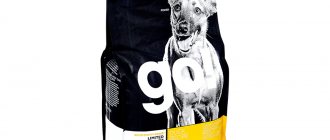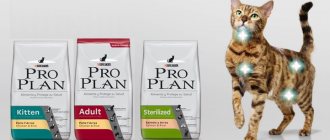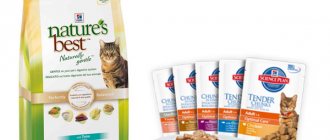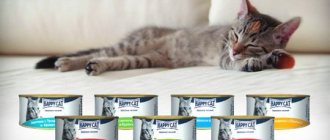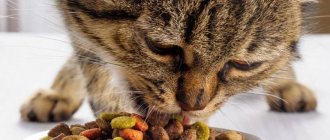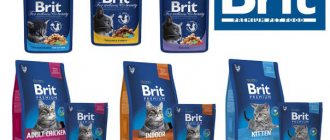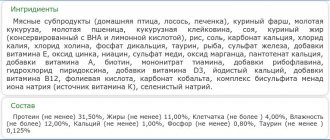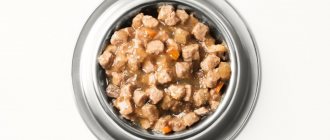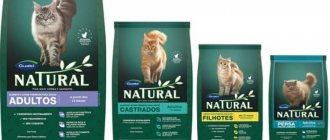Providing your cat with adequate nutrition is key to its excellent health and quality of life. The best way to keep your pet healthy is to learn about the ingredients in his food that are perfect for him and benefit him.
The label on a cat food package lists the ingredients in the can or pouch, but doesn't tell you why or how the ingredients are good for your cat, so you'll want to have some knowledge before heading to the store. Each cat food manufacturer has a different idea of what your cat should consume, and they don't always reach a consensus. Hill's nutritional philosophy is based on the principles of high-quality ingredients, research and innovation that "provide the right balance of essential nutrients to keep pets healthy." Each Hill's food formulation is developed based on scientific research. Studying the biological characteristics of cats allows us to understand the importance of each ingredient in the animal’s body in order to provide it with an optimal diet. Moreover, high-quality ingredients not only satisfy the nutritional needs of animals, but also taste good.
Reading the label
Labels on pet food must comply with the requirements of the Food and Drug Administration's Center for Veterinary Medicine and the Association of American Feed Control Officials (AAFCO), the association that defines and controls the ingredients of any food. for animals at the market. The requirements of the Food and Drug Administration's Center for Veterinary Medicine, AAFCO and FEDIAF are very detailed, down to the way and order in which each ingredient is labeled. Ingredients should be listed in descending order based on weight.
For example, a common misconception is that dog and cat food contains poor quality animal by-products. AAFCO defines the term “meat” in animal feed down to the part of the animal that can or cannot be used, and also explains how it is prepared. The association requires companies to list the ingredients (such as ascorbic acid or vitamin C) that are present as supplements to provide a balanced diet for your pet.
Composition of cat food and benefits of ingredients
According to the Cornell Feline Health Center, a division of the College of Veterinary Medicine at Cornell University, the most important nutritional ingredients to look for when choosing a cat food are protein, fat and carbohydrates. Cat food must meet the requirements for these nutrients. As an absolute carnivore (cats biologically require meat to survive), your kitty needs these ingredients to maintain excellent health. However, the definition of "absolute carnivore" does not mean that a cat cannot obtain nutrients from vegetables, fruits and grains in addition to meat. The type of meat your cat happily consumes is also not as important as the protein it contains. Healthy proteins can also be obtained from other sources, such as eggs and peas.
VetInfo advises that certain vitamins and minerals, namely calcium, vitamin A, iron, magnesium and sodium, are essential for your pet's health and well-being. Formulated specifically for kittens, this cat food includes docosahexaenoic acid (an omega-3 fatty acid essential for brain and eye development), taurine (an amino acid essential for cats of all ages) and folic acid (for cell growth), which are essential for your kitten during the period of development and growth.
In the wild, cats obtain all the necessary nutrients from their prey—bones and other body parts. And the necessary nutrients for domestic cats must be provided by the food that the owner buys.
Necessary and unwanted ingredients
When choosing the best formulated food for your pet, look for a food that provides all the nutrients without any additives.
Ingredients such as meats, vegetables and grains have great nutritional value for your cat, but before you prepare her a homemade meal, remember Cornell's recommendations and buy food rather than cook it yourself. It is extremely difficult to create a recipe that provides the required ratio of nutrients. Instead, you and your veterinarian can work together to decide which food will meet your pet's needs and what flavor she likes. That's why Hill's employs more than 220 veterinarians and pet nutritionists to provide the right nutrient ratios for every stage and lifestyle of a cat.
According to AAFCO regulations, “natural” ingredients are “ingredients that are obtained without chemical synthesis or have not been subjected to chemical synthesis and do not contain any additives or excipients obtained by chemical synthesis, except in quantities that may be present.” in good manufacturing practice." When choosing the best formulated cat food, you should look to Hill's, which contains essential proteins from chicken, vegetables and grains as a source of vitamins and minerals. Therefore, choose a food that has the right ratio of nutrients needed for your cat's health, and not just one that contains natural ingredients.
According to AAFCO, some ingredients, including spices and extracts such as ginger, chamomile, rosemary and fennel, are used to enhance flavor rather than as a source of nutrients. Thus, these ingredients are not added in accordance with the mandatory requirements for a balanced diet for cats. The Food and Drug Administration regularly monitors which ingredients are harmful to cats, such as propylene glycol, a synthetic additive that was banned from cat food in 2017.
Other supplements are sources of amino acids: L-lysine, L-threonine, DL-tryptophan and many others. According to AAFCO, these ingredients must be listed in cat food (there are also guidelines for how much they are allowed).
Advantages and disadvantages
Any product has advantages and disadvantages, and Hill's cat food is no exception. Benefits include:
- balanced composition, based on natural meat products;
- wide range of tastes;
- presence on the packaging of detailed information describing the ingredients;
- a high-quality line of medicinal food, developed under the supervision of veterinarians;
- the ability to choose a hypoallergenic diet;
- availability and reasonable cost.
Varieties of
negative product parameters are as follows:
- wet food is of lower quality than dry food;
- a fairly high percentage of carbohydrates and vegetable protein (except for the IdealBalans line);
- products for everyday feeding contain flavorings and synthetic components;
- may contribute to allergic reactions.
Wet and dry food
Another question to ask yourself when choosing the best cat food formula is whether to choose wet food, dry food, or both. Both types of food are nutritionally complete and therefore meet the nutritional needs of animals equally. Both dry and wet food have their pros and cons.
Canned food is suitable for portion control and contains more water to ensure adequate water intake, especially in sick cats. However, this type of food is more expensive than dry food and is more inconvenient to use, because after opening the package, leftover food must be stored in the refrigerator, and your cat may refuse to eat cold food. (You can reheat leftovers in the microwave and cool hot food to desired temperature.)
Dry food is a great option because it can be stored in a sealed bag, and buying in large quantities saves money. However, keep in mind that even dry food has an expiration date, so make sure you give your pet fresh food.
As you know, cats are quite picky eaters, so you need to choose what they like. Try feeding her both dry and wet food. You can add a little water to dry food to make it easier for your pet to chew, but you should not add milk.
Owner reviews of Hills food
All reviews on the Internet about Hills food can be divided into two groups: opinions of pet store customers and thoughts on cat lovers’ forums. Of course, the first group of reviews may not be very objective, because the store that sells the food is, from the very beginning, not interested in the excessively straightforward opinions posted on its pages, as well as in too strict criticism. But forum visitors, especially their regulars, are not constrained in their judgment, so they can be trusted more.
What do forum users write?
To begin with, before you start judging this or that product for animals, experienced owners of mustachioed and tailed animals make a small note that each pet is unique, and if a certain food is suitable for one of them, then it may not be completely suitable for another, so The point here is not only in the excellent composition of canned food, but also in individual intolerance. In the end, there are animals that even an elite holistic specialist by their standards refuses to eat. What can we say about the premium class?
In general, Hills has a reputation among forum users as a very good food for kittens, but of questionable nutrition for adult cats. There are many stories from women who fed their kitten Hills for a long time, and when he grew up, were forced to switch to another brand due to sudden problems with fur color, blood in the stool, bad breath and shedding... However, this criticism does not apply to Hills medicinal products. That is, Hills is good for sick cats, but not all healthy ones tolerate it well.
What to feed a kitten?
Verdict: this food can be tolerated, since it is, after all, not economy class. However, not everyone does this with their regular diet.
Hills is great for cases when your own regular food has suddenly disappeared from sale, and you haven’t had time to find a new one yet (shouldn’t you be buying Whiskas all this time, or other products recognized as poisons from?).
Well, or even in traditional Slavic cases called “the week before payday,” when the whole family is forced to subsist on pasture, say, pasta, and the cat is forced to subsist on food a grade lower. Still, it’s better than eating Whiskas or Kitiket laden with “chemicals.”
Studying the composition of cat food
If you're looking into the ingredients of cat food, you definitely want to give your cat the best possible care. An experienced owner is the best owner. While you're researching ingredients and ingredients, you'll likely come across different nutritional philosophies (as if you were choosing food for yourself), as well as a lot of anecdotal information based on someone else's personal opinion. It's important not to fall prey to this opinion because you could be putting your cat's health at risk if you try to follow advice on the Internet. You can trust recommendations from close friends or family members, who no doubt give them with the best intentions. Every cat is unique and should be treated properly. Talk to your veterinarian about any concerns you have about what is in a particular food to see if the information you have can be trusted. Doctors are the most reliable and qualified source of information when it comes to choosing the best cat food.
If you want to completely change the food, consult your veterinarian first. Making your own choices based solely on ingredient information can be problematic, especially if you want to remove a specific ingredient from your pet's diet.
Consult with your veterinarian to select the ideal cat food, so you can determine the most balanced diet for your furry friend.
Medicinal feed
The Hill's prescription diet line of medicinal food for cats includes more than 10 varieties.
Such a diet should only be prescribed by a veterinarian, who takes into account the identified pathologies of the pet. It is also important to coordinate the frequency and continuation of feeding with a specialist. Medicinal food is used for feeding only during therapy and during the recovery period after illness. These products contain some elements in large quantities, which can harm the body of a healthy animal.
The manufacturer produces the following line of balanced diets for four-legged friends who suffer from kidney dysfunction and urological pathologies:
- SD is Hill's brand food, which is advisable to use in courses for the prevention or treatment of urinary tract pathologies.
- CD is recommended for use during the treatment of cystitis and urolithiasis.
- KD is a diet that veterinarians prescribe to their patients during the treatment of kidney diseases.
- GD is advisable to use in cases where chronic renal failure is combined with diseases of the heart muscle.
- LD is recommended for feeding four-legged friends suffering from liver failure.
- ID – food for cats diagnosed with pathologies of the digestive system.
- WD are ready-made diets that have a wide range of effects on the body of an animal suffering from constipation, colitis, and intestinal inflammation.
If your four-legged friend is overweight, various pathologies can develop. This is why it is so important to adjust your pet’s weight in a timely manner. The manufacturer produces products that are intended for feeding overweight cats.
- MD is an option ideal for furry purrs who suffer from obesity, and cats who have been diagnosed with an excess of glucose in the plasma.
- RD is a ready-made food for cats that are forced to adhere to a diet.
- Metabolic – helps speed up metabolism and weight loss.
- Metabolic + Urinary helps animals not only lose weight, but also cope with urolithiasis.
Line of other feeds:
- YD – used during the treatment of thyroid pathologies.
- JD is a ready-made diet that helps cope with joint diseases.
- TD is a ready-made food from a well-known brand, which veterinarians prescribe during the treatment of oral diseases.
- ZD is an ideal diet for four-legged friends with allergies.
